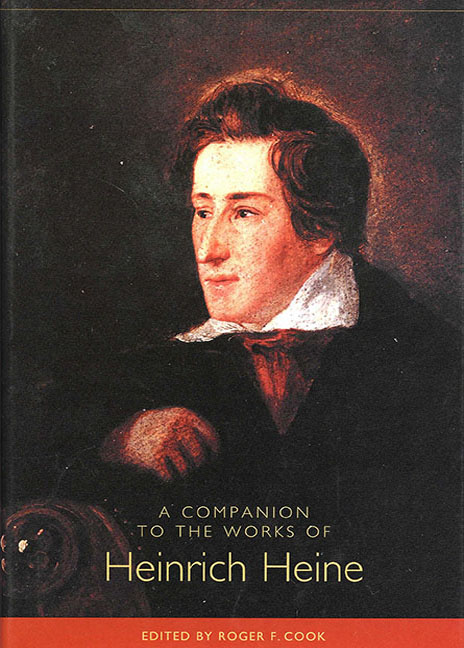Book contents
- Frontmatter
- Contents
- Acknowledgments
- Chronology of Heine's Life
- Heine's Major Works
- List of Abbreviations
- Introduction
- The Romantic Poet
- Philosophy, History, Mythology
- Religion, Assimilation, and Jewish Culture
- Modernity: Views from the Poet's Crypt
- Mathilde's Interruption: Archetypes of Modernity in Heine's Later Poetry
- Late Thoughts: Reconsiderations from the “Matratzengruft”
- Reception in Germany
- Notes on the Contributors
- Index
Late Thoughts: Reconsiderations from the “Matratzengruft”
from Modernity: Views from the Poet's Crypt
Published online by Cambridge University Press: 29 July 2017
- Frontmatter
- Contents
- Acknowledgments
- Chronology of Heine's Life
- Heine's Major Works
- List of Abbreviations
- Introduction
- The Romantic Poet
- Philosophy, History, Mythology
- Religion, Assimilation, and Jewish Culture
- Modernity: Views from the Poet's Crypt
- Mathilde's Interruption: Archetypes of Modernity in Heine's Later Poetry
- Late Thoughts: Reconsiderations from the “Matratzengruft”
- Reception in Germany
- Notes on the Contributors
- Index
Summary
I. Prelude to a Taboo Subject
Whenever the subject of Heinrich Heine's final years crops up, his biographers and commentators tend to display a degree of diffidence. This is excusable since the depiction of mortality and death as a tangible reality stripped of fictionalization has never been a popular topic among the living. Though there are a number of other topics and motifs to keep it company, necessity nonetheless compelled the author to devote the end of his days to this abysmal theme, which to him became literally a life-and-death struggle. However, he handled it with such a sense of ease and liberty that his readers were left bewildered and helpless (and to some extent this is still true of his current readership), even while his visitors, according to reports by contemporaries, were frequently irritated by his manner. Still, Heine's oeuvre does not present a picture of consistency followed seamlessly by silence. His preparations for the hour of death are reminiscent of the Baroque tradition, but they are transposed into secular realms, without, however, omitting questions about the final order of things.
To this day Heine's late poetry and prose cause the kind of discomfort we experience at our own inability to aid others with incurable infirmities, who nonetheless are able to talk with us about their frailties in detail. Thus the late writing is sometimes seen as a foreign corpus whose free form and self-perpetuating autonomy are each fascinating in their own right. Indeed, Heine could not possibly be more direct in addressing his audience — he never leaves the certainty of physical decay to conjecture and, yet, he would not dream of appealing to public commiseration. Polite euphemisms are not tolerated, except in the final letters to his mother in Hamburg. Elsewhere the prevailing tone is one of unblinking honesty, as he puts his conscience through the subtlest introspections, probing both his physical reactions and those of his soul. On September 12, 1848 he wrote his physician brother Maximilian this shockingly crude observation: “Dieser lebendige Tod, dieses Unleben, ist nicht zu ertragen, wenn sich noch Schmerzen dazu gesellen… . meine Lippen sind gelähmt wie meine Füße, auch die Eßwerkzeuge sind gelähmt ebensosehr wie die Absonderungskanäle. Ich kann weder kauen noch kacken, werde wie ein Vogel gefüttert.
- Type
- Chapter
- Information
- A Companion to the Works of Heinrich Heine , pp. 315 - 342Publisher: Boydell & BrewerPrint publication year: 2002

